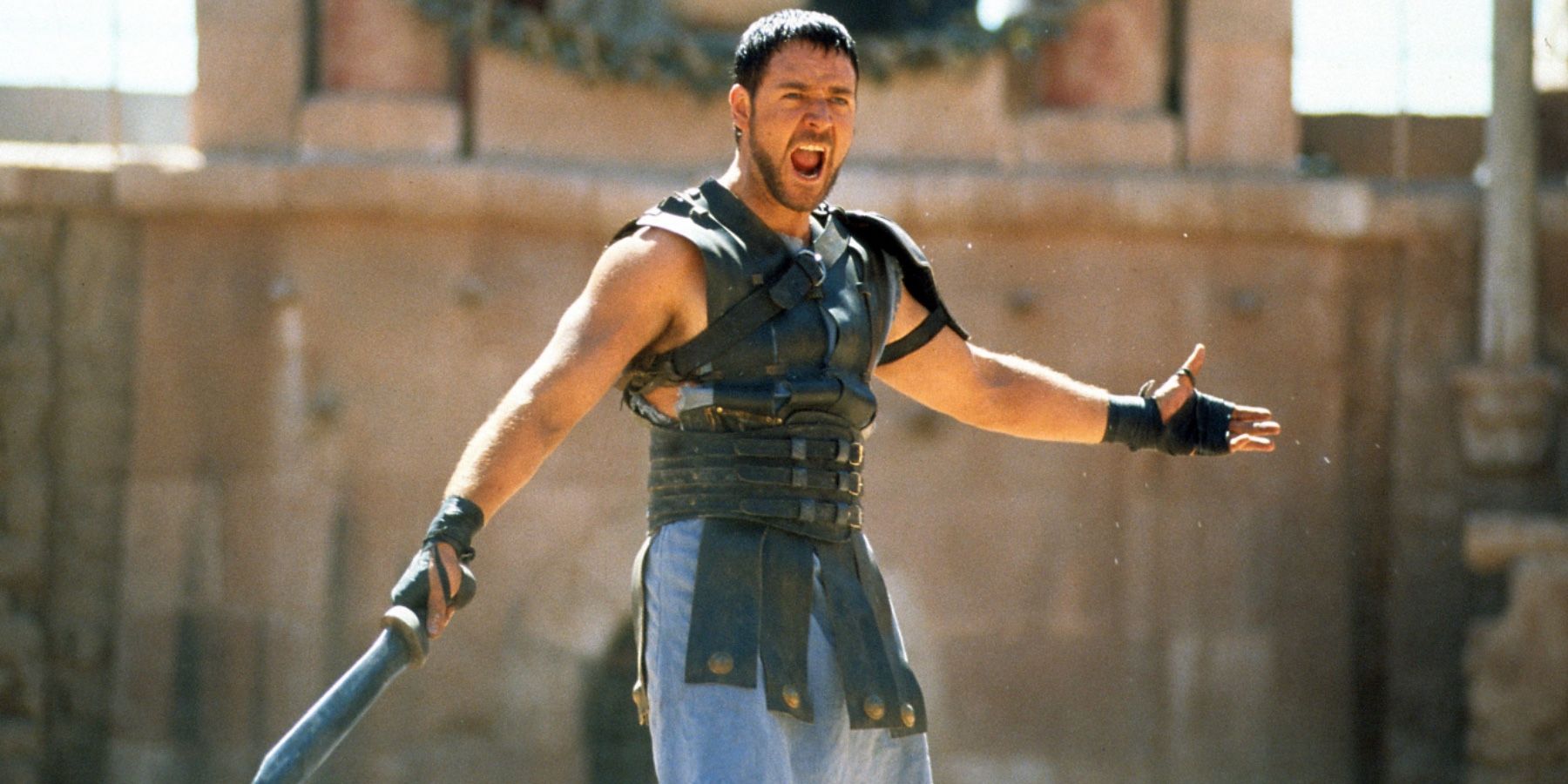When was Gladiator released? This question has sparked curiosity among cinephiles and history enthusiasts alike. Released in a time when epic films were making a significant comeback, Gladiator became a cultural phenomenon that redefined the historical drama genre. Directed by Ridley Scott and starring the legendary Russell Crowe, this cinematic masterpiece took the world by storm, earning numerous accolades and a permanent place in film history. So, let's dive into the story behind its release and what made it so iconic!
Imagine this: a movie that blends breathtaking visuals, compelling storytelling, and a star-making performance from Russell Crowe. Gladiator was more than just a film; it was an experience that transported audiences back to the grandeur of ancient Rome. From its powerful score to its unforgettable battle sequences, the movie left a lasting impression on everyone who watched it.
But when exactly did this epic tale hit the big screen? The answer lies in the spring of 2000, a year that would forever be remembered as the birth of a modern classic. Let's explore the journey of Gladiator, from its conception to its release and beyond, uncovering the secrets that made it a timeless masterpiece.
Read also:Baby Monkeys The Cutest Creatures Stealing Our Hearts
Gladiator Release Date: A Historic Debut
So, when was Gladiator released? The film officially premiered on May 1, 2000, in Los Angeles, marking the beginning of its triumphant journey across the globe. Directed by Ridley Scott, Gladiator was not just another historical drama; it was a cinematic event that captivated audiences worldwide. The movie's release date was strategically chosen to coincide with the summer blockbuster season, ensuring maximum visibility and impact.
Interestingly, the film's release wasn't without its challenges. Initial test screenings revealed mixed reactions, with some audiences questioning its runtime and pacing. However, the filmmakers stood by their vision, and the final cut proved to be a masterpiece that resonated with both critics and viewers alike. The movie's success at the box office and its subsequent sweep at the Academy Awards cemented its place in cinematic history.
Why the Release Date Matters
The release date of Gladiator was significant for several reasons. First, it coincided with the growing demand for epic films that combined historical accuracy with modern filmmaking techniques. Second, it allowed the film to capitalize on the buzz generated by its marketing campaign, which emphasized the themes of honor, betrayal, and vengeance. Finally, the timing ensured that Gladiator could compete with other summer blockbusters, proving that historical dramas could hold their own against action-packed thrillers.
Gladiator: A Brief Biography of the Film
Production and Filming
Before we delve deeper into the release of Gladiator, let's take a moment to appreciate its production journey. Filming began in early 1999, with locations spanning from Spain to Tunisia, capturing the grandeur of ancient Rome. The production team worked tirelessly to recreate the authenticity of the Roman Empire, from the intricate costumes to the massive Colosseum set. This attention to detail paid off, as the film's visual splendor became one of its defining features.
Cast and Crew
Gladiator featured an all-star cast, led by Russell Crowe as Maximus Decimus Meridius, a Roman general turned gladiator. Supporting him were Joaquin Phoenix, Connie Nielsen, and Djimon Hounsou, among others. The chemistry between the cast members brought depth and authenticity to their performances, making the characters come alive on screen. Ridley Scott's direction added another layer of brilliance, ensuring that every scene was both visually stunning and emotionally resonant.
Gladiator's Impact on Cinema
Gladiator's release in 2000 marked a turning point in the world of cinema. It revitalized the historical drama genre, inspiring a new wave of films that explored ancient civilizations and epic battles. The movie's success proved that audiences were hungry for stories that combined spectacle with substance, paving the way for future blockbusters like Troy, Kingdom of Heaven, and 300.
Read also:Exploring The Red Pavilion A Journey Into History Culture And Mystique
Moreover, Gladiator's influence extended beyond the box office. Its themes of justice, loyalty, and redemption struck a chord with viewers, sparking discussions about the relevance of these values in modern society. The film's exploration of power and corruption also resonated with audiences, making it more than just entertainment but a thought-provoking experience.
Gladiator's Legacy
Fast forward two decades, and Gladiator remains a beloved classic, frequently cited as one of the greatest films of all time. Its legacy is evident in the numerous awards it received, including five Academy Awards, and its enduring popularity among fans worldwide. The movie's ability to transcend generations is a testament to its universal appeal and timeless storytelling.
Box Office Performance
When Gladiator hit theaters, it quickly became a box office sensation, grossing over $457 million worldwide on a budget of $103 million. Its success was fueled by positive word-of-mouth and critical acclaim, making it one of the highest-grossing films of 2000. The movie's performance at the box office was a testament to its universal appeal and the hard work of everyone involved in its production.
Key Box Office Milestones
- Opened at #1 in North America, earning $35 million in its opening weekend
- Top-grossing film in several international markets, including the UK and Australia
- Remained in the top 10 for several weeks, demonstrating its staying power
Critical Reception
Gladiator received widespread critical acclaim upon its release, with many hailing it as a masterpiece of modern cinema. Critics praised its epic storytelling, stunning visuals, and outstanding performances, particularly Russell Crowe's portrayal of Maximus. The film's ability to balance historical accuracy with dramatic flair was often highlighted as one of its greatest strengths.
Some of the most notable reviews came from prestigious publications such as Rolling Stone, which called it "a triumph of storytelling and spectacle," and The New York Times, which described it as "a film of epic proportions and emotional depth." These glowing reviews helped solidify Gladiator's reputation as a must-see film.
Awards and Nominations
Gladiator's critical success translated into numerous awards and nominations. At the 73rd Academy Awards, it won five Oscars, including Best Picture and Best Actor for Russell Crowe. The film also garnered accolades at the Golden Globes, BAFTAs, and other major award ceremonies, cementing its status as one of the most acclaimed films of the early 2000s.
Gladiator's Cultural Significance
Beyond its commercial and critical success, Gladiator has had a profound impact on popular culture. It introduced a new generation to the allure of ancient Rome and inspired countless works of art, literature, and film. The movie's themes of honor and redemption continue to resonate with audiences, making it a cultural touchstone that transcends time.
In addition to its influence on the film industry, Gladiator has also had a lasting impact on the tourism industry. Locations featured in the movie, such as the Colosseum in Rome and the El Jem Amphitheatre in Tunisia, have become popular tourist destinations, attracting visitors from around the world.
Gladiator's Enduring Popularity
Even today, Gladiator remains a beloved film that continues to captivate new audiences. Its availability on streaming platforms and home video has ensured that its legacy lives on, introducing it to generations of fans who appreciate its timeless appeal. The film's ability to remain relevant in an ever-changing media landscape is a testament to its enduring quality and universal themes.
Interesting Facts About Gladiator
Here are some fun facts about Gladiator that you might not know:
- The film's score, composed by Hans Zimmer and Lisa Gerrard, was inspired by ancient Roman music and features a choir singing in Latin
- Russell Crowe's character, Maximus, was named after his real-life ancestors, who were Roman soldiers
- The Colosseum set built for the film was so massive that it required over 100 carpenters and builders to construct
Conclusion
When was Gladiator released? The answer is May 1, 2000, a date that will forever be remembered in the annals of cinema history. Gladiator's release marked the beginning of a new era for historical dramas, proving that epic films could resonate with modern audiences. Its success at the box office, critical acclaim, and cultural impact have cemented its place as one of the greatest films of all time.
So, if you haven't already, take some time to revisit this cinematic masterpiece. Whether you're a fan of epic films, history, or just great storytelling, Gladiator has something for everyone. And remember, the legacy of Maximus lives on, inspiring us to fight for justice and honor in our own lives.
Call to Action: Share your thoughts on Gladiator in the comments below! Have you seen the film? What did you think? And don't forget to check out our other articles for more insights into the world of cinema.
Table of Contents


